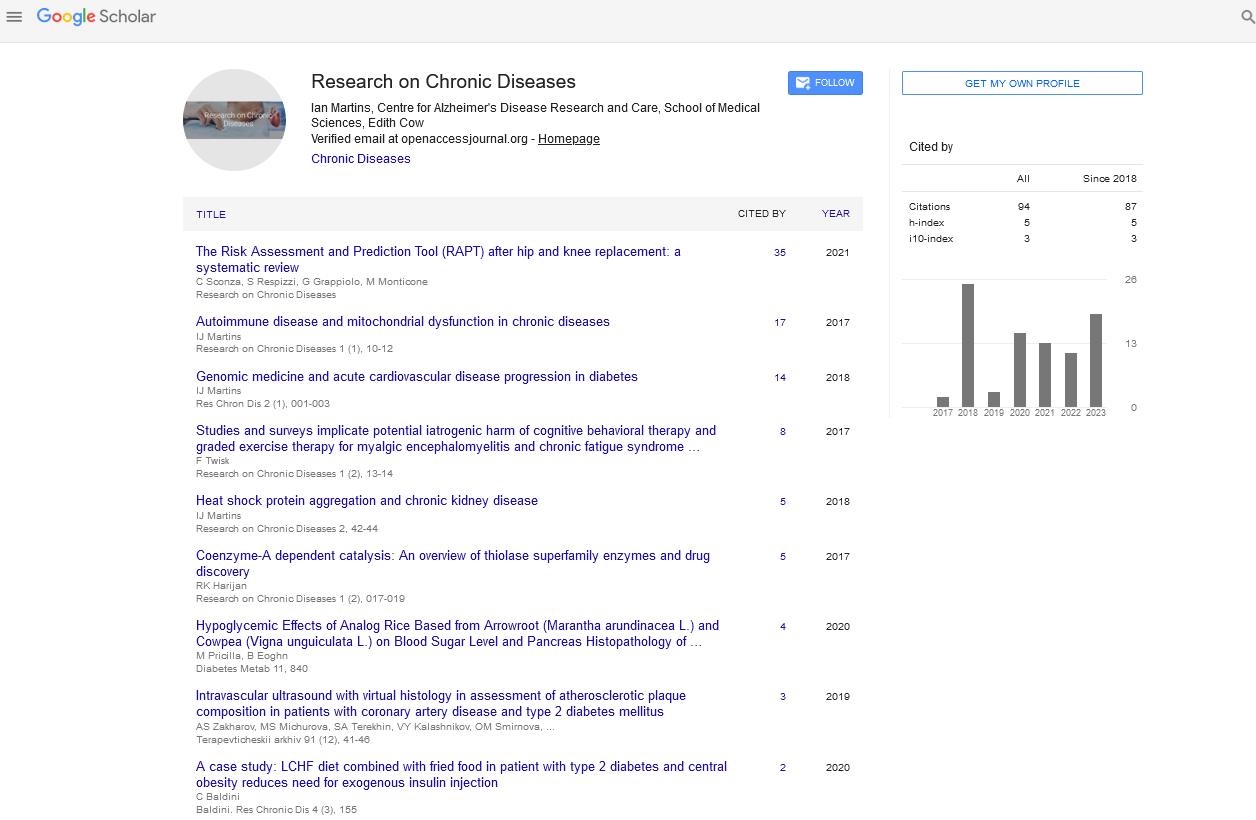Perspective - Research on Chronic Diseases (2024) Volume 8, Issue 5
Exploring the Complexities of Infertility: A Modern Perspective
- Corresponding Author:
- Frenchie Lester
Department of Gynaecology,
Arutanga University,
Arutanga,
Cooks Island
E-mail: lest89@Gmail.com
Received: 04-Jul-2024, Manuscript No. OARCD-24-140628; Editor assigned: 09-Jul-2024, PreQC No. OARCD-24-140628 (PQ); Reviewed: 23-Jul-2024, QC No. OARCD-24-140628; Revised: 01- Oct-2024, Manuscript No. OARCD-24-140628 (R); Published: 29-Oct-2024, DOI: 10.37532/ OARCD.2024.8(5).228-229
Introduction
Infertility, once whispered in hushed tones, now stands boldly at the intersection of medical science, societal norms and personal resilience. Defined as the inability to conceive after one year of regular unprotected intercourse, infertility affects millions globally, challenging couples’ dreams of parenthood and reshaping societal expectations. In this article, we delve into the multifaceted aspects of infertility, from its causes and treatments to its emotional and social impacts.
Description
Understanding infertility
Infertility is not merely a medical condition but a profound life crisis for those affected. Globally, approximately 10%-15% of couples experience infertility, a statistic that transcends geographical, cultural and economic boundaries. The causes of infertility are diverse, ranging from physiological factors such as hormonal imbalances, structural abnormalities and genetic issues to lifestyle factors like smoking, obesity and environmental toxins. Moreover, advancing age significantly impacts fertility, with women over 35 facing increased challenges due to declining egg quality and quantity.
Medical interventions: From diagnosis to treatment
The journey towards overcoming infertility typically begins with a thorough medical evaluation. Diagnostic tools such as blood tests, imaging techniques and specialized fertility assessments help pinpoint underlying issues. Treatments vary based on the cause but often include medications to stimulate ovulation, surgical interventions to correct anatomical abnormalities and Assisted Reproductive Technologies (ART) such as In Vitro Fertilization (IVF) or Intra Uterine Insemination (IUI).
The emotional landscape: Navigating hope and despair
Beyond the clinical realm, infertility exerts a profound emotional toll on individuals and couples. The rollercoaster of hope and disappointment through failed pregnancies or unsuccessful treatments can lead to feelings of grief, guilt and inadequacy. Mental health support and counseling play pivotal roles in helping individuals cope with the emotional upheaval and maintain resilience throughout their fertility journey.
Diagnosis and challenges
Diagnosing fibromyalgia remains a clinical challenge due to its diverse and often overlapping symptoms with other conditions. Physicians typically rely on a combination of patient history, physical examination and exclusion of other possible causes of symptoms. The American College of Rheumatology guidelines emphasize the presence of widespread pain and tenderness in at least 11 of 18 specified tender points as key diagnostic criteria, though newer guidelines focus more on a comprehensive assessment of symptoms.
The impact on identity and self-worth
Infertility can profoundly shape one’s sense of identity and self-worth. For many, parenthood represents a core aspect of personal fulfillment and societal validation. Coping with the uncertainty of fertility challenges can prompt individuals to reassess their life goals, redefine success, and cultivate resilience in the face of adversity.
Impact on quality of life
Living with fibromyalgia can significantly impair quality of life. Chronic pain and fatigue can limit physical activity and lead to social isolation. Sleep disturbances and cognitive dysfunction further exacerbate these challenges, affecting work productivity and interpersonal relationships. The unpredictable nature of symptoms often necessitates a multidisciplinary approach to management, involving healthcare providers, mental health professionals, and supportive care networks.
A holistic approach to wellness
Addressing infertility requires a holistic approach that integrates medical interventions with mental, emotional, and physical well-being. Lifestyle modifications, stress management techniques, and alternative therapies like acupuncture or yoga can complement medical treatments, promoting overall health and fertility.
Fostering empathy and awareness
Increasing public awareness and empathy is essential in destigmatizing infertility. Education initiatives, media representation, and advocacy efforts play pivotal roles in challenging misconceptions, fostering inclusivity, and supporting those navigating the complexities of infertility.
Societal and cultural perspectives
Infertility is often intertwined with cultural expectations and societal pressures surrounding parenthood. In many cultures, the ability to conceive and bear children is deeply embedded in notions of identity, family lineage, and societal acceptance. This can intensify the stigma and isolation experienced by those struggling with infertility, compounding their emotional burden.
Technological advancements and ethical considerations
Advancements in reproductive technologies have revolutionized fertility treatments, offering new hope to many. However, these innovations also raise ethical dilemmas concerning embryo selection, genetic screening, and the commodification of human reproduction. Debates surrounding the ethical use of technology in fertility treatments underscore the need for balanced regulation and informed decision-making.
Beyond Biology: Alternative paths to parenthood
For those facing persistent infertility, alternative paths to parenthood such as adoption or surrogacy often emerge as viable options. These paths provide avenues to build a family and redefine traditional notions of parenthood, offering hope and fulfillment beyond biological ties.
Advocacy and support: Fostering awareness and community
As infertility continues to impact millions worldwide, advocacy efforts and support networks have emerged to amplify voices, challenge stigma, and promote inclusive healthcare practices. These initiatives aim to foster empathy, raise awareness about infertility, and advocate for accessible and equitable reproductive healthcare for all.
Conclusion
In conclusion, infertility is a multifaceted journey that transcends medical definitions, encompassing emotional, social, and ethical dimensions. It challenges individuals and societies to rethink traditional narratives about parenthood, resilience, and the value of diverse pathways to family building. By fostering open dialogue, supporting research, and advocating for compassionate care, we can empower individuals and couples navigating infertility to find hope, healing, and fulfillment on their unique paths to parenthood.
